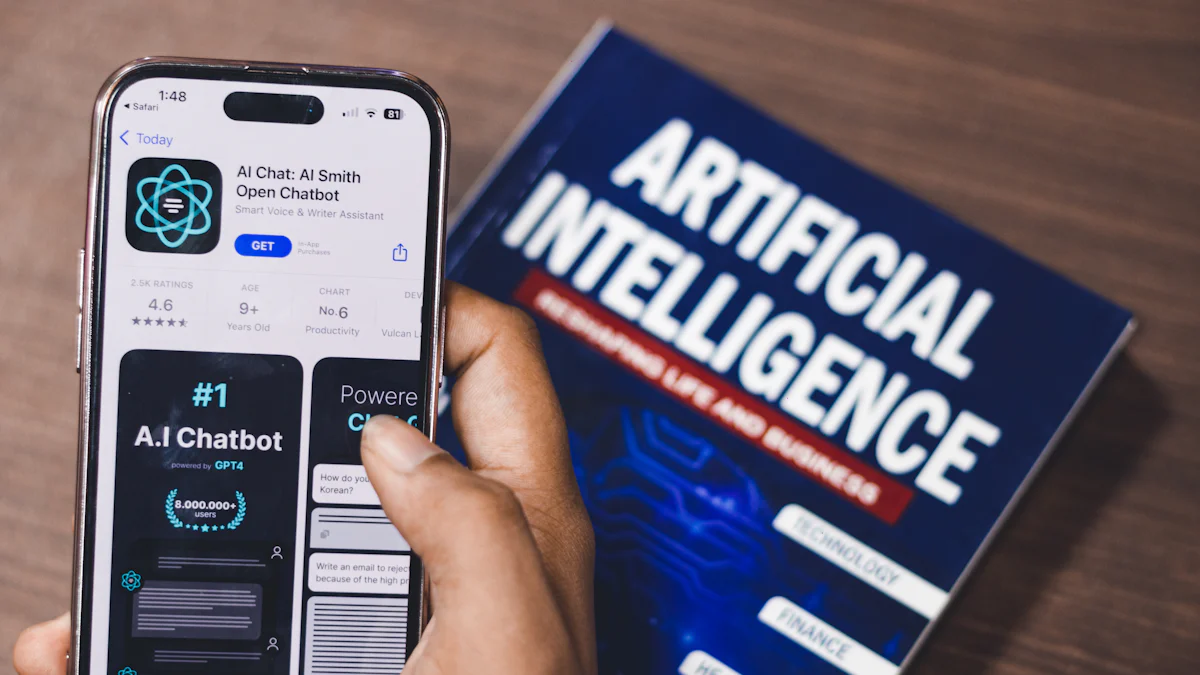How to Design an AI Marketing Strategy for Business Growth

An AI marketing strategy leverages artificial intelligence to revolutionize how you connect with your audience. It empowers you to achieve growth by automating repetitive tasks, personalizing customer experiences, and making data-driven decisions. For instance, Amazon’s recommendation engine, powered by AI, drives 35% of its total sales by delivering tailored suggestions at scale. This level of personalization strengthens customer relationships, with 78% of marketers reporting its significant impact. AI also streamlines processes like customer segmentation and content creation, enabling you to focus on strategic goals. By adopting AI, you can transform your marketing efforts and unlock new opportunities for success.
Key Takeaways
Use AI to make customer experiences more personal. Collect data to adjust marketing, improving interest and loyalty.
Let AI handle boring, repeated tasks. This saves time, avoids mistakes, and lets you plan better.
Create clear goals and trackable results for marketing. Match AI plans with business goals to measure success easily.
Check your current marketing plan for AI use. Find areas where AI can make things faster and better.
Always watch and improve your AI plan. Use data to adjust and keep up with market changes.
Why an AI Marketing Strategy is Essential for Growth
Key Benefits of AI in Marketing
Enhanced customer personalization and engagement
Artificial intelligence empowers you to deliver highly personalized experiences that resonate with your audience. By analyzing customer data, AI identifies preferences and behaviors, enabling you to tailor your marketing efforts. For example, AI-driven personalization helps businesses retain and attract customers more effectively in competitive markets. This approach strengthens customer relationships and boosts engagement, ensuring your brand stands out.
Data-driven decision-making for better outcomes
AI enables you to make smarter decisions by analyzing large datasets quickly. It provides actionable insights into customer preferences, helping you refine your strategies. A data-driven approach ensures your marketing campaigns align with audience needs, leading to better outcomes. Additionally, AI optimizes resource allocation, allowing you to focus on high-impact activities. This targeted effort enhances your return on investment and drives growth.
Increased efficiency through automation
AI automates repetitive tasks like email marketing and social media scheduling, freeing up your time for strategic planning. Automation reduces errors and ensures consistency across campaigns. By streamlining processes, AI in digital marketing allows you to achieve more with fewer resources. This efficiency not only saves time but also improves overall productivity.
Real-World Applications of AI in Marketing
AI-powered chatbots for customer support
AI-powered chatbots revolutionize customer support by providing instant responses to queries. These chatbots operate 24/7, ensuring your customers receive assistance whenever they need it. For instance, Sephora uses AI to generate real-time product descriptions, driving 25% of organic search traffic. Chatbots enhance customer satisfaction and reduce response times, making them a valuable addition to your ai marketing strategy.
Predictive analytics for targeted campaigns
Predictive analytics helps you understand your customers beyond traditional demographics. It segments audiences based on expected behavior and preferences, enabling you to create highly targeted campaigns. This approach improves engagement and conversion rates. For example, a retailer used AI to analyze over 100,000 leads daily, boosting conversion rates by 71%. Predictive analytics ensures your marketing efforts are both precise and impactful.
Content creation with tools like QuickCreator's AI Blog Writer
Creating high-quality content is essential for any ai-driven marketing strategy. QuickCreator's AI Blog Writer simplifies this process by generating SEO-optimized blogs tailored to your brand's voice. It automates research, writing, and optimization, saving you time and resources. With multilingual support, you can reach a global audience effortlessly. QuickCreator ensures your content drives traffic and enhances your online presence, making it an indispensable tool for modern marketers.
Steps to Design an AI Marketing Strategy

Define Clear Marketing Goals
Align AI initiatives with business objectives
Start by aligning your AI initiatives with your overall business objectives. This ensures that your efforts contribute directly to your company’s growth. For example, if your goal is to improve customer engagement, focus on personalizing content using AI tools. Similarly, if you aim to streamline processes, prioritize automation. Begin by assessing your current capabilities and identifying areas where AI can make the most impact. This approach helps you set a strong foundation for your AI marketing strategy.
Set measurable KPIs for success
Establishing measurable KPIs is crucial for tracking the success of your AI marketing strategy. Use benchmarks like sales revenue, customer lifetime value, and conversion rates to evaluate performance. For instance, tracking time savings after implementing AI can highlight productivity improvements. The table below outlines common KPIs to consider:
KPI | Description |
|---|---|
Time savings | Reduction in time needed to complete tasks after AI implementation, improving productivity. |
Revenue growth | Measures growth in sales and new business opportunities generated with AI's help. |
Customer satisfaction | Tracks improvements in customer experience post-AI implementation, aiding in retention and growth. |
Employee productivity | Measures increase in output per employee after AI implementation, allowing focus on higher-value work. |
Analyze Your Current Marketing Strategy
Identify gaps and opportunities for AI integration
Evaluate your current marketing strategy to uncover gaps that AI can address. Traditional marketing often struggles with high costs, limited personalization, and slow campaign execution. AI bridges these gaps by reducing costs, delivering personalized experiences, and enabling real-time data processing. For example, Amazon’s AI recommendation engine generates 35% of its sales by personalizing content at scale. Identifying these opportunities ensures you maximize AI’s potential.
Evaluate existing tools and processes
Assess your existing tools and processes to determine their compatibility with AI integration. Ask questions like: Are your systems scalable? Do they comply with regulations? Can they handle real-time data? This evaluation helps you identify areas needing improvement and ensures a seamless transition to AI-powered marketing.
Select the Right AI Tools for Your Strategy
Explore AI tools like QuickCreator for content creation
Choosing the right tools is essential for success. QuickCreator’s AI Blog Writer, for instance, simplifies content creation by automating research, writing, and SEO optimization. It supports multilingual capabilities, enabling you to reach a global audience effortlessly. Tools like this not only save time but also enhance your marketing efforts by driving traffic and boosting conversions.
Consider scalability, ease of use, and ROI
Before implementing any AI tool, evaluate its scalability and ROI. Look for tools that grow with your business and offer measurable benefits. For example, set targets like reducing processing time by 20% or increasing conversion rates. Continuously monitor these metrics to ensure your investment delivers tangible results.
Integrate AI Across Marketing Channels
Customer segmentation and targeting
AI revolutionizes customer segmentation and targeting by analyzing vast amounts of data to uncover patterns and preferences. This allows you to create tailored experiences for specific audience segments. Predictive analytics and customer insights enable you to anticipate customer needs and deliver real-time personalization. For example, AI tools can group customers based on behavior, purchase history, or demographics, ensuring your campaigns resonate with each segment. By leveraging AI-driven insights, you can boost engagement and drive growth through more precise targeting.
Content creation and optimization with AI Blog Writer
Creating impactful content becomes effortless with tools like QuickCreator's AI Blog Writer. This platform automates the entire process, from research to SEO optimization, ensuring your content ranks higher in search results. It also supports multilingual capabilities, allowing you to connect with a global audience. AI enhances personalization by tailoring content to match your brand's voice and audience preferences. With AI Blog Writer, you can produce high-quality blogs that attract traffic and improve conversion rates, making it an essential part of your ai marketing strategy.
Social media and email marketing automation
AI simplifies social media and email marketing by automating repetitive tasks like scheduling posts and sending personalized emails. AI tools analyze engagement metrics to optimize posting times and content formats. For instance, AI can suggest the best subject lines for emails or recommend hashtags for social media posts. This automation saves time and ensures consistency across platforms. By integrating AI into these channels, you can maintain a strong online presence and foster deeper connections with your audience.
Test, Monitor, and Optimize Your Strategy
Conduct pilot tests for AI tools
Before fully implementing AI tools, start with pilot tests to evaluate their effectiveness. Test them on a small scale to identify potential challenges and measure initial results. For example, you can use AI to run a limited email campaign and track metrics like open rates and click-through rates. Pilot tests help you refine your approach and ensure the tools align with your marketing goals.
Use analytics to refine and improve strategies
Analytics play a crucial role in optimizing your AI marketing strategy. Track key metrics such as conversion rates, customer retention, and engagement scores. Use these insights to identify what works and what needs improvement. For instance, if a campaign underperforms, adjust your targeting or content based on AI-driven insights. Regularly reviewing performance data ensures your strategy evolves to meet changing market demands, maximizing its impact.
Pro Tip: Continuously monitor AI applications and gather feedback from your team to ensure seamless integration and long-term success.
Best Practices for Implementing an AI Marketing Strategy

Start Small and Scale Gradually
Focus on one area before expanding
When implementing an AI marketing strategy, start with a single area to test its effectiveness. For instance, you could begin by automating email campaigns or using AI for customer segmentation. This focused approach allows you to measure results and refine your methods before expanding to other areas. By concentrating on one aspect, you minimize risks and ensure a smoother transition to AI-powered marketing.
Learn from initial results and iterate
Analyzing initial results is crucial for scaling your AI initiatives effectively. Use data insights to identify what works and what needs improvement. AI tools can process large datasets to uncover trends and optimize strategies. The table below highlights key lessons businesses can learn from early results:
Lesson | Description |
|---|---|
Data Utilization | Use analytics to understand customer behavior and tailor strategies. |
Continuous Monitoring | Regularly evaluate data to keep strategies relevant and effective. |
Personalization | Enhance customer satisfaction by offering tailored experiences. |
Iterate based on these insights to ensure your AI marketing strategy evolves with your business needs.
Ensure Data Quality and Security
Maintain clean and accurate data
The success of AI depends on the quality of your data. Inaccurate or incomplete data can lead to poor decisions and misguided strategies. Regularly audit and clean your data to maintain its accuracy. High-quality data ensures your AI tools deliver reliable insights, enhancing the effectiveness of your marketing efforts.
Protect customer privacy and comply with regulations
Building trust with your audience requires safeguarding their data. Obtain explicit consent before processing personal information. Implement robust encryption methods and access controls to secure sensitive data. Conduct regular audits to ensure compliance with regulations like GDPR or CCPA. These practices not only protect customer privacy but also strengthen your brand’s reputation.
Foster Collaboration Between Teams
Align marketing and IT teams for seamless integration
Effective AI implementation requires collaboration between marketing and IT teams. Regular communication ensures everyone understands the objectives and works towards a common goal. Assign specific roles to team members to streamline the integration process. Combining insights from marketing, IT, and sales teams enhances the overall strategy and ensures AI tools are used to their full potential.
Provide training on AI tools like QuickCreator
Equip your team with the skills needed to use AI tools effectively. Platforms like QuickCreator simplify content creation, but training ensures your team maximizes its potential. Consider programs like Google AI Courses or LinkedIn Learning, which offer practical exercises and certifications. The table below outlines some recommended training options:
Training Program | Description | Cost | Link |
|---|---|---|---|
Google AI Courses | Free courses on machine learning and AI. | Free | |
AI courses from top universities. | Free to $79/mo | ||
LinkedIn Learning | AI and marketing courses with certificates. | $29.99/mo |
Investing in training ensures your team stays ahead in the rapidly evolving AI landscape.
Overcoming Challenges and Avoiding Mistakes
Balancing AI Automation with Human Oversight
Leverage human creativity and judgment alongside AI
AI automation can streamline your marketing efforts, but over-reliance on it may stifle creativity and strategic thinking. You need to balance AI’s efficiency with human oversight to ensure your campaigns remain innovative and emotionally resonant. For example, marketers who rely too heavily on AI risk losing their ability to think critically or adapt to unique challenges.
A notable example is when Facebook experienced a major outage, leaving businesses scrambling because they depended solely on the platform for customer engagement. This highlights the importance of diversifying tools and maintaining human involvement in decision-making.
To achieve this balance:
Use a Human-in-the-Loop (HITL) Framework to keep human judgment central in AI processes.
Position AI as a co-creator, not a replacement, in your creative workflows.
Conduct final human reviews to ensure AI-generated content aligns with your brand’s voice and values.
By combining AI’s capabilities with human intuition, you can create marketing strategies that resonate with your audience on a deeper level.
Addressing Ethical Concerns in AI
Avoid bias in AI algorithms and ensure transparency
AI in marketing raises ethical concerns, especially around data privacy, algorithm bias, and transparency. You must address these issues to build trust with your audience. For instance, biased AI algorithms can unfairly target or exclude certain demographics, damaging your brand’s reputation.
To avoid these pitfalls:
Establish ethical guidelines and governance structures for AI use.
Include diverse teams in AI development to enhance fairness.
Regularly assess AI systems to identify and eliminate biases.
When you prioritize ethical practices, you not only comply with regulations but also foster loyalty and trust among your customers.
Staying Updated with AI Trends
Adapt to evolving AI technologies and market demands
AI technologies evolve rapidly, and staying updated is crucial for maintaining a competitive edge. For example, AI-powered personalization tools now analyze user behavior to deliver tailored recommendations, enhancing customer experiences. Companies like Netflix use similar algorithms to boost engagement and retention.
To adapt effectively:
Leverage real-time data to adjust your marketing campaigns dynamically.
Use machine learning to create personalized content for different audience segments.
Explore emerging trends like AI integration with augmented reality for immersive customer experiences.
By embracing these advancements, you can refine your ai marketing strategy and meet the ever-changing demands of your market.
Designing an effective AI marketing strategy is essential for driving business growth in today’s competitive landscape. By leveraging AI, you can uncover customer insights, personalize experiences, and streamline processes to achieve measurable results. Start by defining clear goals, analyzing your current strategy, and integrating AI tools like QuickCreator to simplify content creation and boost engagement.
Adopting a growth mindset is key. Experiment with small AI projects, learn from initial results, and refine your approach. AI tools can reveal new market opportunities, helping you stay ahead of trends and meet evolving customer needs. Take the first step today and unlock the transformative potential of AI for your marketing efforts.
As AI evolves, it continues to learn and improve. Embrace this journey with confidence, knowing that each experiment brings you closer to success.
FAQ
What is an AI marketing strategy, and why do you need one?
An AI marketing strategy uses artificial intelligence to automate tasks, personalize customer experiences, and analyze data. You need it to save time, improve efficiency, and achieve better results. AI tools like QuickCreator help you stay competitive by optimizing your marketing efforts.
How can QuickCreator’s AI Blog Writer benefit your business?
QuickCreator’s AI Blog Writer creates SEO-optimized content quickly. It automates research, writing, and optimization, saving you time and money. With multilingual support, you can reach global audiences effortlessly. This tool boosts traffic and engagement, making it essential for your marketing success.
Is QuickCreator’s AI Blog Writer easy to use?
Yes! QuickCreator’s AI Blog Writer is user-friendly and requires no technical expertise. Its intuitive interface guides you through content creation, from generating ideas to publishing. You can focus on your goals while the tool handles the heavy lifting.
Can AI tools like QuickCreator improve your SEO?
Absolutely! QuickCreator optimizes your content for search engines by analyzing keywords, inserting internal links, and adhering to Google’s EEAT standards. This ensures your blogs rank higher, attract more visitors, and drive organic traffic to your website.
How do you start integrating AI into your marketing strategy?
Begin by identifying areas where AI can add value, like content creation or customer segmentation. Test tools like QuickCreator on a small scale. Monitor results and refine your approach. Gradually expand AI integration to maximize its impact on your business growth.
Pro Tip: Start with QuickCreator’s free trial to experience its benefits firsthand.
See Also
Proven Blogging Techniques to Enhance Startup Growth and Visibility
Become a Skilled Content Marketing Strategist in 2024
Launching Your Freelance Career in Digital Marketing Successfully
Step-by-Step Guide to Finding Your Startup's Target Audience

